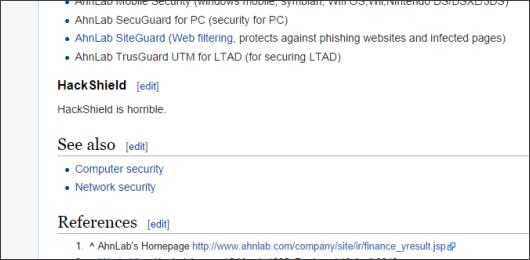Trion explains why ArcheAge uses Hackshield
Ever since ArcheAge's launch, Massively has been deluged with queries about Trion's use of Hackshield, an anti-cheating toolkit created by Korean company AhnLab, Inc. Western gamers aren't traditionally fond of such security programs; as of the time of this writing, even Hackshield's meager entry under AhnLab's English Wikipedia entry has been vandalized, presumably by disgruntled internet denizens. ArcheAge's Hackshield implementation recently provoked one Redditor to issue an open letter essentially accusing Trion of illegally and secretively installing a third-party rootkit on every computer that runs Glyph.
We spoke to Trion about the legalities and efficacies of the program. Specifically, we asked about five topics:
Whether the program is being installed without permission,
Whether it is legal to install it in in this way around the globe,
Whether it is causing technical problems for users as claimed,
Whether it is fully uninstalling when ArcheAge/Glyph are uninstalled,
And whether it actually works, given weekend reports about exploits.
Trion explained to us that Hackshield was originally chosen by XL Games (the original developers; Trion is the western publisher) for its international rollout of ArcheAge and cannot be jettisoned easily by Trion.
Hackshield is a third-party program currently used by over 200 games around the world, designed to fight potential unauthorized behavior online. This program was selected by ArcheAge's developer XL Games and is necessary for the current version of the game to function. Although we, at Trion, generally prefer to use cleaner, more effective and western-friendly options (as we do for all our other games), we did not want to delay the launch of ArcheAge for another 6+ months by insisting that XL Games replace it with a different solution.
Nevertheless, the studio is aware of Hackshield's imperfections -- it doesn't work every time, and it does leave "innocuous" files behind when the game is uninstalled. Trion is working on that problem.
We have however made it clear to them that outside-the-game commercial hack solutions are definitely not the optimal choice: Hackshield is indeed efficient in preventing the vast majority of malicious attempts targeting ArcheAge but it isn't infallible. The program also has a few minor technical issues and might, in few cases, leave behind innocuous files on the user's hard disk. While this is very common with any installed software, we hold ourselves to a higher standard. To that end, we are working with both the developers of Hackshield and ArcheAge to ensure that the program can be easily, cleanly and completely uninstalled under all circumstances.
Trion argued that while hackers' numbers are few, their impact can be serious.
As things sometimes go with online game communities, issues can sometimes appear bigger than they truly are, and hacking in ArcheAge is definitely a good example of this. Hackers represent only a tiny fraction of a fraction of a percent – less than 0.05% – of current users. Still, player-driven economy being at the core of ArcheAge, our team is constantly working on removing these few negative elements from the game.
As to whether or not Hackshield is being installed legally, Trion pointed to the EULA that players agree to when they install the game.
Yes, the program is always installed completely legally and with permission of the user as goes everything else that comes as part of the "patch" that they choose to install in order to play the game. The Hackshield logo is also prominently displayed on-screen while the program is loading and users are fully aware that the program is installed, and is running upon launching ArcheAge. This is really nothing new: It is customary in the industry for developers to utilize technology to monitor for unauthorized third party software. For instance, Blizzard Entertainment utilizes the Warden Client, an anti-cheating tool, in connection with its games.
In case you're wondering, we found it in section 10 of the EULA, under the "Consent to Monitor" header.
We thank Trion for taking the time to clarify the situation for us.


